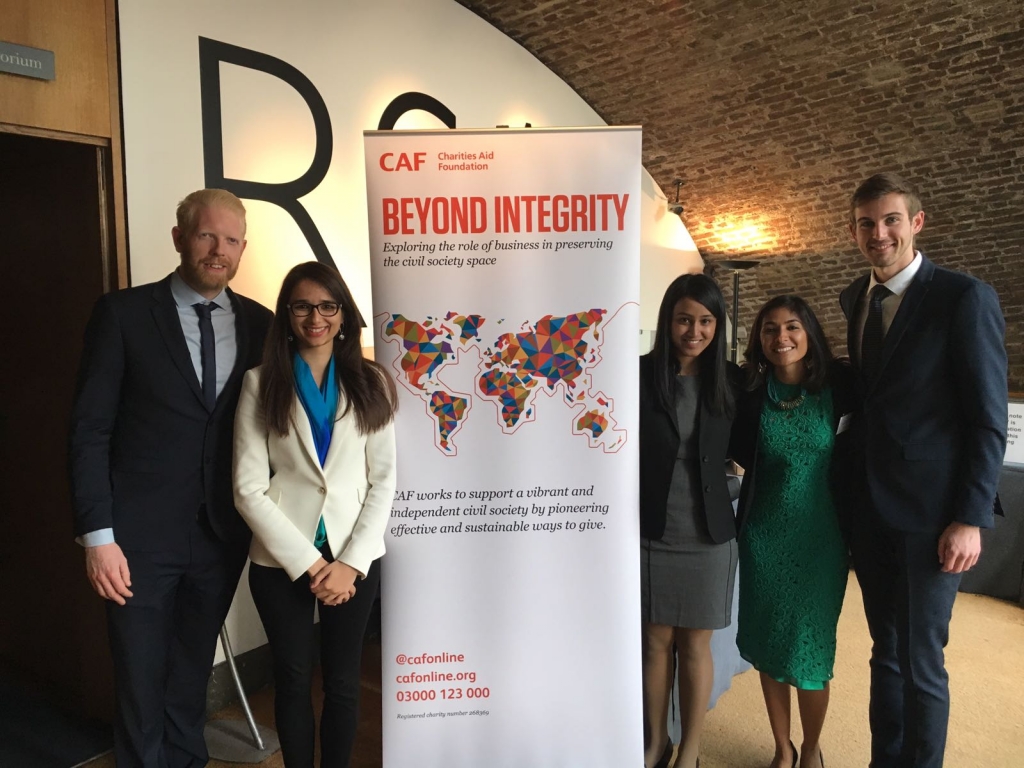A small team of students from the MSc Development Management 2015/2016 course presented a successful report last week in collaboration with Charities Aid Foundation at the pre-launch event for their research. Silky Agrawal, Brooks Reed, and Riya Saxena share their experiences:
This past year we had the opportunity to participate in the consultancy project as part of the MSc Development Management Program. Our report, Beyond Integrity: Exploring the Role of Business in Preserving the Civil Society Space, was commissioned by Charities Aid Foundation (CAF), a London-based NGO that operates on the border between the business and civic spaces. The paper was very successful – CAF decided to publish, and we presented our findings to stakeholders from business and civil society organizations at a invite-only pre-launch event in mid-October. The panel of experts that discussed the report included leaders in the field, such as a former US Deputy Assistant Secretary of State for Democracy, Human Rights, and Labor. The Department has asked us to write about our takeaways from the project, and we are happy to share about our experiences and give some advice for future Development Managers.
From the beginning, our task was daunting: we were effectively creating a new space for dialogue surrounding business and human rights practices. We chose the project because we were all interested in private sector development, but our research question dealt with issues beyond the pale of traditional conversations about corporate social responsibility and sustainability: how can we create an environment that encourages the private sector to engage in preserving the civil society space?
Corporations are generally illiterate in civic space issues, but there is growing pressure for them to engage in support of human rights defenders facing oppression from national governments around the world. Our research focused on four cases of positive corporate action to define a new paradigm for responsible behavior.
We developed our cases through a series of semi-structured stakeholder interviews. Securing the initial interviews was tough – we had to be creative in making contacts, resorting to unconventional strategies such as tweeting at hard-to-reach contacts or adding them on LinkedIn, but we were helped most by our professors at LSE, who have impressive networks both in London and the field. Throughout the whole process we conducted over 30 interviews and received input from diverse stakeholders, from the human rights defenders who were the subject of some of our cases to a series of high-level managers from companies such as Inditex, PUMA, H&M, and New Look.
Looking back on the process, we know that we have learned an incredible amount from the project and each other. The journey to this point has involved a steep learning curve, but we are proud of our final product and we hope that the following advice can help aspiring Development Managers get as much, if not more, from their projects in the future:
- Extra effort can pay off: from the beginning, we decided that we wanted to create a product that was academically robust, but also useful to the organization. We put in a lot of time sifting through the data from our cases to identify the most valuable and impactful key learnings. Then, even after the submission of the report to LSE, we committed to work further with our clients for 6 more months to refine the language of the paper to communicate better with the targeted audience. This involved a further round of interviews and a revision of key parts of the report. Although this was difficult to juggle with exams and dissertation writing, it paid off in the quality of the final report and established our credibility as experts in our topic area.
- Team Management: our team dynamic was distinct and best suited to each team member’s strength. Although we set roles in the beginning, we quickly discovered that it was more efficient to operate more flexibly, supporting one another as the need arose. We worked very well because we were open to critical feedback from each other, and we were willing to prioritize the quality of the report over our own self-validation – something that allowed us to work without personal ego getting in the way.
- Be bold to follow your passion in choosing a project: While working with big organizations can be an invaluable experience, doing your project on an issue in which you are passionate contributes to the work being more authentic, engaging, and personally rewarding.
Throughout the process, we were so very fortunate to have CAF as our clients, specifically our contacts Sameera Mehra and Adam Pickering. They gave us the space to conceptualize the scope of the study while also giving us support and appropriate training that allowed us to effectively engage with the relevant stakeholders. We are grateful to CAF for valuing our work, recognizing the hard work we put in, and using it to stimulate dialogue in this new space.
As part of the MSc Development Management programme, teams of 3-5 students do ‘live’ consulting work for real-world, public, private, and non-profit organisations such as the World Bank, Oxfam, PricewaterhouseCoopers, GIZ, CARE, DFID, Save the Children, UNICEF, the Emerging Markets Group and Wedu. Along with seminar presentations, the project adds a key applied component – teaching students real-world practical skills. You can read similar blog posts from Development Management students here.







It’s a great report. I blogged about it on From Poverty to Power (http://oxfamblogs.org/fp2p/whyhow-should-corporates-defend-civil-society-space-good-new-paper-case-studies/) and the World Bank’s governance blog (http://blogs.worldbank.org/publicsphere/whyhow-should-corporates-defend-civil-society-space-good-new-paper-case-studies), and the Guardian covered it as well, including some anti-capitalist protest quotes from NGOs (https://www.theguardian.com/sustainable-business/2016/oct/21/report-praising-companies-on-human-rights-criticised-as-whitewash). All in all, impressive coverage for a student consultancy project, but it totally merits it!